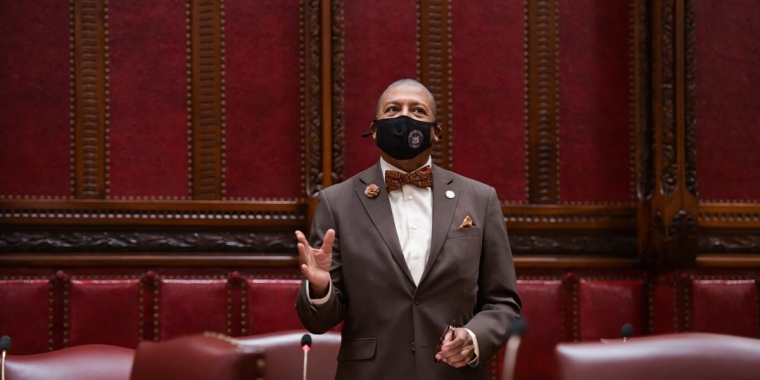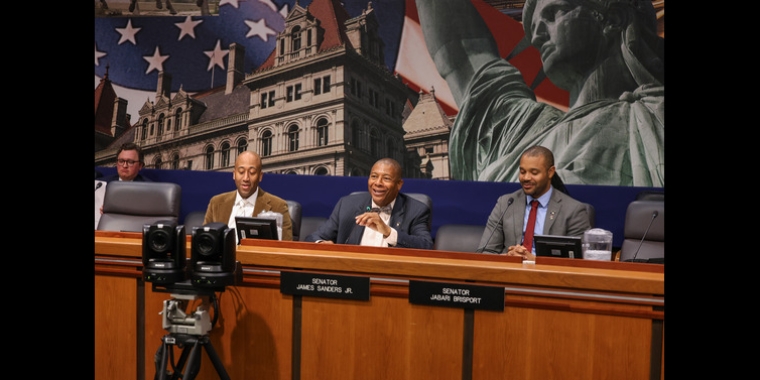
Senator James Sanders Jr. and the Senate Majority Pass 2021-22 New York State Budget
April 7, 2021

Senator James Sanders Jr. and the Senate Democratic Majority passed the 2021-2022 State Budget that makes historic investments in education, the environment, and economic recovery.
“During this year’s budget negotiations, we faced many challenges due to the COVID-19 pandemic however, I believe given the circumstances, this is the best budget we could have completed,” Sanders said. “Of course there will be bumps in the road as we implement many new policies changes but I am confident that my democratic colleagues and I are up to the challenge and that this fiscal year will bring forth many worthy accomplishments.”
As we do every year, let us look at the budget from a win, lose, or draw perspective. Sometimes we refer to it as the good, the bad and the ugly.
WIN
The enacted State Budget delivers tax breaks for working and middle-class New Yorkers while ensuring that millionaires and billionaires pay their fair share to build a balanced and equitable fiscal foundation capable of providing vital support and services for families and businesses still struggling as New York recovers from the COVID-19 pandemic.
This Budget recognizes the sacrifices that healthcare and other frontline workers made during the pandemic and takes steps to help many struggling workers who have been left behind.
The Senate Majority is working to build back a stronger economy as New York recovers from the COVID-19 pandemic. The Enacted Budget supports small businesses who have suffered throughout this pandemic and delivers investments to support job growth opportunities across New York State.
LOSE
There were important policies missing, Senator Sanders would have liked to have seen even more revenue increases on the wealthiest whose wealth has only grown during the pandemic.
The repeal stock transfer tax rebate was not passed. This is a tax that could have rebuilt New York State's infrastructure and is a tax it currently collects on each stock transaction but is fully rebated. If the State kept the funds, it would be raising at least $13 billion annually in additional revenue on the wealthiest individuals who mostly live outside the state.
Other revenue measures were not included in the Enacted Budget including increasing the inheritance tax on the wealthy and a billionaire’s tax. These additional funds could have been spent for new infrastructure, assisting small businesses and MWBEs, struggling homeowners and renters, providing affordable higher education, better schools, clean energy, and much more.
DRAW
The passage of the Marijuana Regulation and Taxation Act (MRTA) will establish a new office for the regulation of cannabis and decriminalizes the use of adult-use marijuana. Senator Sanders has long said that he is not in favor of legalization marijuana for many reasons. He still has many reservations. However, his colleagues Senator Krueger and Majority Leader People-Stokes worked tirelessly for years to figure out a way to legalize cannabis that is beneficial to the citizens of New York State and to mitigate potential harms.
The 2021-2022 Enacted Budget includes:
- A historic $1 billion investment in New York’s small businesses to supplement federal aid.
- Providing $800 million for small business grants.
- Providing $200 million in small business tax credits.
- The Pandemic Recovery and Restart Program that creates a $35 million Restaurant Return-to-Work Tax Credit.
- Provides a $1.4 billion increase in Foundation Aid and a three-year Foundation Aid phase-in that will finally fulfill the State’s commitments under the Campaign for Fiscal Equity.
- Provides a $105 million expansion of full-day prekindergarten, providing pre-K funding to 210 districts who don’t currently receive state-funded full-day Pre-K.
- Prevents continuing tuition increases at SUNY and CUNY by putting in place a three-year freeze on the rational tuition plan.
- Increases the current top state personal income tax rate of 8.82 percent rate to 9.65 percent for individual filers whose income is over $1 million and joint filers over $2 million.
- Establishes two new brackets at a rate of 10.30 percent for those whose income is between $5 million and $25 million and 10.90 percent for those whose income is over $25 million.
- Legalizes Mobile Sports Wagering.
- This proposal will increase education revenue by $99 million in SFY 2021-22, growing to $357 million in SFY 2022-23, before reaching $500 million in SFY 2025-26.
- Delivers $440 million in property tax relief for 1.3 million New Yorkers earning under $250,000 based on the proportion of their income spent paying property taxes. The income tax credits will range between $250 and $350.
- $2.4 billion in COVID-19 Emergency Rental Assistance Program with 12 months’ arrears for rent and utilities, three prospective months of rent, a year of eviction protection, and eligibility of up to 120% AMI, regardless of immigration status.
- $600 million in homeowner assistance, including $20 million a year for Homeowner Protection Program (HOPP) for the next 3 years.
- $350 million in transportation infrastructure investments.
- Restores $415 million in proposed Medicaid cuts for hospitals and healthcare providers.
- Restores $113 million in proposed cuts to public health programs and adds an additional $81 million in public health funding.
- Requires nursing homes to spend at least 70% of their revenue on direct patient care and 40% on resident-facing staffing, with $64 million for increased staffing.
- A $2.4 billion infusion to the child care system to increase access and support providers.
- A $2.1 billion Excluded Worker Fund to provide one-time unemployment benefits to workers who lost employment or income during the COVID-19 pandemic but were ineligible for Unemployment Insurance or other federal benefits such as stimulus payments.
- Authorizes the $3 billion Environmental Bond Act of 2021, "Restore Mother Nature," to fund environmental improvements that preserve, enhance, and restore New York's natural resources and reduce the impact of climate change. The Bond Act will appear on the ballot in the 2022 general election.
- Establishing the Community Violence Intervention Act, which declares gun violence a public health crisis and creates a funding source for community and hospital-based violence intervention programs.
- $2 million for the Minority and Women-Owned Business Development and Lending Program
Share this Article or Press Release
Newsroom
Go to Newsroom


